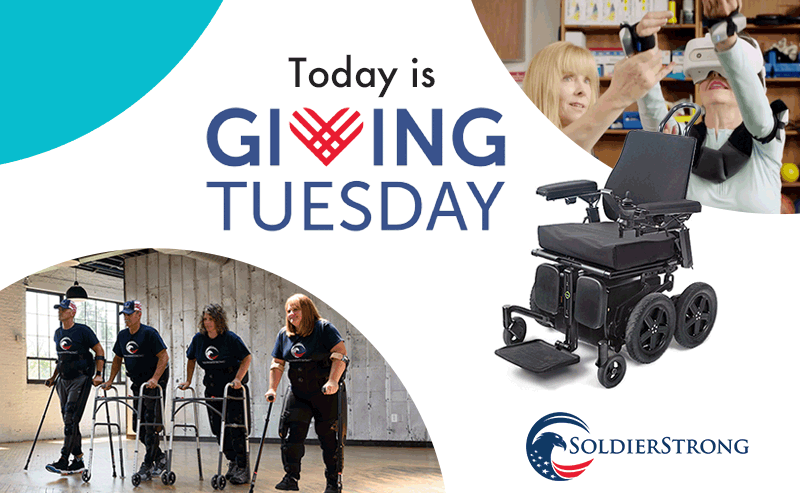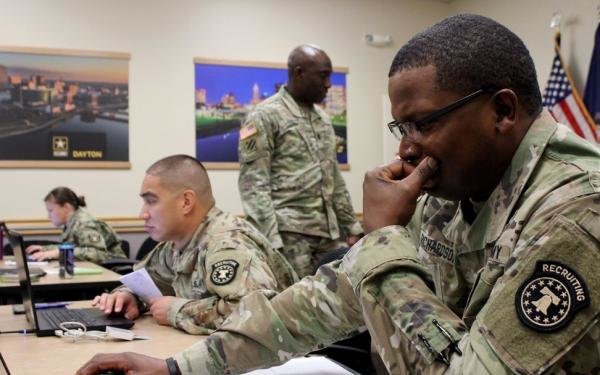
Today we have the opportunity to change a much deserving veteran’s life for the better!
This Giving Tuesday you are undoubtedly receiving a plethora of requests from many of the organizations that hold a special place in your heart. Just like so many other organizations that are spearheading initiatives heading into the holiday season that are worthy of your time and contributions, we too here at SoldierStrong are requesting the immediate support of red, white and blue-loving patriots to help us change a veteran’s quality of life forever.
Last year SoldierStrong launched a new program by partnering with the iconic Dean Kamen and his company, Mobius Mobility, to deliver the iBOT ® Personal Mobility Device to our nation’s heroes. Dean is an engineer, inventor and businessman, who is perhaps best known for his invention of the Segway. However, we here at SoldierStrong believe that one of his most important pieces of work is the iBOT ® PMD – if you haven’t seen it in action yet then we want to make sure that you know just how incredible it truly is!
The iBOT ® PMD removes many barriers so that those who are confined to a wheelchair can more easily enjoy everyday activities again – often these are activities that most of us take for granted. The iBOT ® PMD allows for improved mobility, social interaction and the ability for users to experience the world around them at standing level. Activities like dancing with your spouse, going up and down stairs, having conversations at eye level, traveling on a variety of terrains like beaches and sidewalks, and even being able to take a dog for a walk, are not only made possible but they are made enjoyable again.
Imagine not having the ability to partake in these activities and the added stress this inability could potentially cause on your everyday life, as well as the everyday experience of loved ones. With the iBOT ® PMD those limitations are removed! The technology is changing the lives of veterans from across the country for the better and in turn, reflects what SoldierStrong values and strives for. Our focus as an organization is to provide life-changing, revolutionary equipment and groundbreaking therapy to our nation’s heroes.
Last year through the generous support of Americans from across the country, SoldierStrong was able to donate an iBOT ® PMD to a veteran just in time for Christmas. In fact, when U.S. Army Veteran Peter Townsend received a donated iBOT ® PMD, he had this to say: “It’s amazing the type of terrain this thing can travel on. I’ve been outside almost non-stop with it. This machine has truly been life changing. It makes me feel like a new person. I’m doing things I haven’t been able to do for years and I am so thankful.”
On this Giving Tuesday, we know of another deserving veteran that is in immediate need of the iBOT ® PMD. Our greatest hope is that we will be able to donate a device to him this Christmas. And you have the ability to help us make this a reality today!
The price tag on the iBOT ® PMD is $35,000, which can make it extremely difficult for many veterans to purchase on their own. But when broken down, it is more than doable for SoldierStrong to make these donations with the help of our loyal supporters. We only need 1,000 patriots to contribute $35 today in order to surprise another veteran in need with their very own iBOT ® PMD this Christmas. We believe with your help this wish will become a reality!
Today, SoldierStrong humbly asks that you make a huge impact in the life of this veteran by giving your very best gift. Whatever amount you give, we value your support. The life-changing donations we make are only possible because of the generosity of people like you that want to give back to those that served our great nation.
We kindly implore you to give your best gift to this initiative! Whether your gift is $15, $35, $100 or even $1,000, all donations are critical to our efforts. Perhaps you might even be blessed with the ability to fund the cost of an entire iBOT ® PMD.
Whatever your giving capacity is, we are forever grateful for your support to help us gift a true American hero with their very own iBOT ® PMD. Let’s work together this Giving Tuesday and give back to our nation’s heroes. Together we can make it happen!


